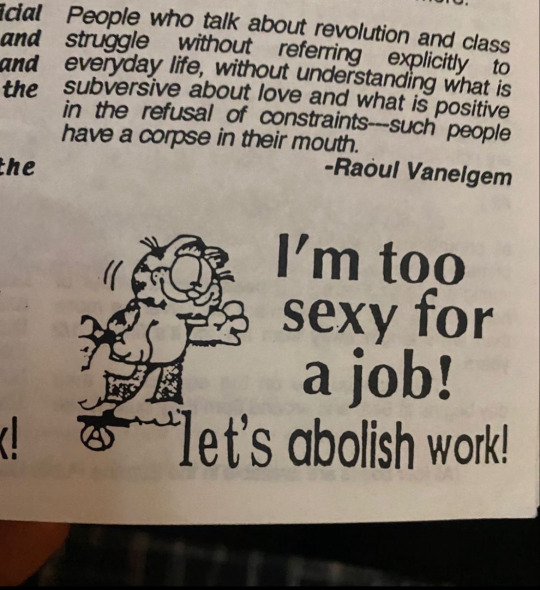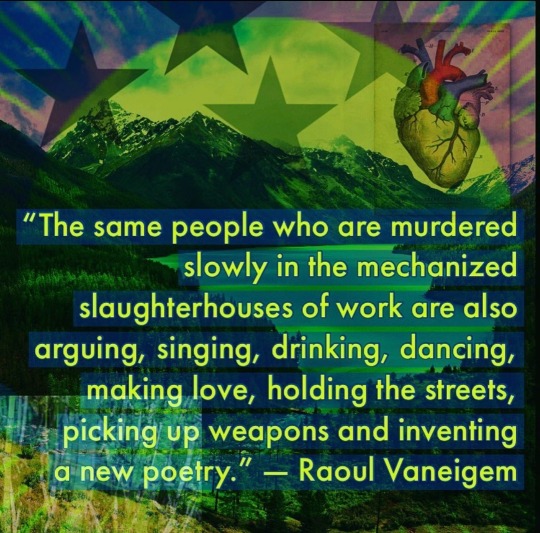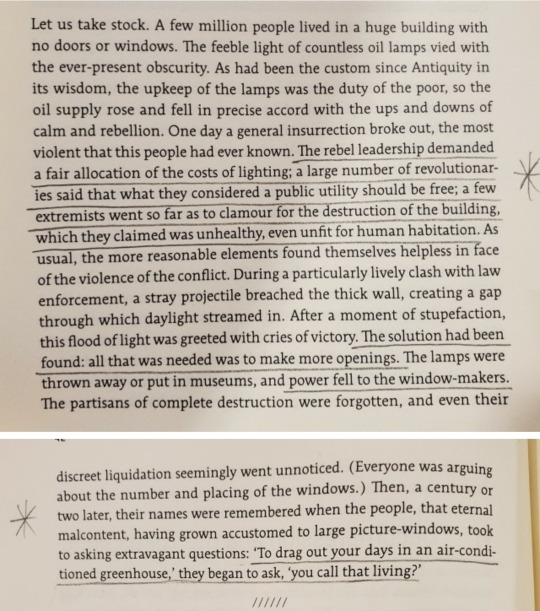#raoul vaneigem
Text
People usually associate creativity with works of art, but what are works of art alongside the creative energy displayed by everyone a thousand times a day: seething unsatisfied desires, daydreams in search of a foothold in reality, feelings at once confused and luminously clear, ideas and gestures presaging nameless upheavals. All this energy, of course, is relegated to anonymity and deprived of adequate means of expression, imprisoned by survival and obliged to find outlets by sacrificing its qualitative richness and conforming to the spectacle's categories. Think of Cheval's palace, the Watts Towers, Fourier's inspired system, or the pictorial universe of Douanier Rousseau. Even more to the point, consider the incredible diversity of anyone's dreams - landscapes the brilliance of whose colors qualitatively surpass the finest canvases of a Van Gogh. Every individual is constantly building an ideal world within themselves, even as their external motions bend to the requirements of soulless routine.
Raoul Vaneigem, The Revolution of Everyday Life (1967)
354 notes
·
View notes
Text

Good morning
#abolish capitalism#anti capitalism#socialism#social revolution#raoul vaneigem#Marx#karl marx#Marxism#garfield
56 notes
·
View notes
Text

[x]
#raoul vaneigem#situationism#anti capitalism#socialism#alienation#de alienation#revolution of everyday life#quote
617 notes
·
View notes
Text
Every game has two preconditions: the rules of playing and playing with the rules. Watch children at play. They know the rules of the game, they can remember them perfectly well but they never stop breaking them, they never stop dreaming up new ways of breaking them. But for them, cheating doesn’t have the same connotations as it does for adults. Cheating is part of the game, they play at cheating, accomplices even in their arguments. What they are really doing is spurring themselves on to create new games. And sometimes they are successful: a new game is found and unfolds. They revitalise their playfulness without interrupting its flow.
The game dies as soon as an authority crystallises, becomes institutionalised and clothed in a magical aura.
Raoul Vaneigem, from Revolution of Everyday Life (tr. John Fullerton, Paul Sieveking)
#raoul vaneigem#revolution of everyday life#translations#nonfiction#essays#on defamiliarization#2022 reads
181 notes
·
View notes
Text

Work. The word has a stink of executions and of slow agony. It’s the coat of mud and pus that soils the hidden side of the gold coins: the decimated slaves, the flayed serfs, the proletarians sliced in two by fatigue, fear, and the oppression of the passing days, life broken into pieces by the wage.
The truest monuments to its efficient glory are the glassed in balconies looking out over gates saying “Arbeit macht frei”, a message that expresses the quintessence of commodity civilization: work will free you... from life.
― Raoul Vaneigem
10 notes
·
View notes
Text

IS posting begins
3 notes
·
View notes
Text
« La mise au travail collective, exigée par l’agriculture et le commerce, impose à chaque être humain une redistribution de son espace et de son temps.
C’en est fini du nomadisme et de la gratuité des jours et des nuits. Les heures consacrées aux activités de production refoulent la satisfaction des pulsions naturelles dans une sorte de parenthèse occupée par le repos réparateur et située dans une marge temporelle où la productivité ne domine pas : la nuit, la fête, les lieux secrets, l’imaginaire, le rêve.
Telle est la séparation fondamentale: le travail nécessaire jette l’interdit sur les désirs, qui ne connaissent d’autre loi que leur jouissance, et les condamne à se satisfaire dans la honte de l’inutilité, dans l’occulte, à la sauvette et au revers de la vie qu’ils drainent initialement.
Avec l’intrusion du travail, le corps perd sa totalité sensuelle, il se scinde en deux principes: la tête, élément dirigeant, dont la pensée contrôle et réprime l’énergie libidinale, et le corps, élément dirigé, réduit à une musculature lucrative, à la main servile.
J’appelle “perspective inversée”, ou “perspective marchande”, l’état de choses où la jouissance est réprimée comme force hostile au travail et à sa civilisation, où la vie se racornit en survie, où les plaisirs, frappés par l’interdit, ne s’affirment jamais que déchirés en une blessure mortelle. Une civilisation où la gratuité de la vie, traitée comme un mal absolu, est refoulée dans la nuit du négatif, chargée d’angoisse et de culpabilité, et débusquée dans un défoulement où elle paie tribut à la mort.
La nécessité de sacrifier la quête de la jouissance gratuite à l’obligation sociale de travailler a imprimé, il y a quelque dix mille ans, un mouvement d’inversion globale à l’évolution de la vie humaine telle qu’elle se dégageait lentement de la nature, à la façon de l’enfant se développant dans le ventre maternel. Nous le savons d’autant mieux qu’en chaque naissance se révèle aujourd’hui à la conscience la distorsion qui s’empare identiquement de l’enfant pour l’étirer jusqu’à la mort dans une existence qui est la négation de toute existence humaine.
Aucune illusion céleste ou terrestre ne peut désormais le dissimuler: la voie artificiellement tracée à l’humanité, c’est la vie séparée de soi, devenue étrangère à elle-même et condamnée – elle qui ne peut exister quelque part sans affirmer sa volonté d’être partout – à s’objectiver dans un monde de choses jusqu’à la perfection de l’objet inerte, jusqu’au cadavre, modèle social achevé de l’homme enfin confondu avec la marchandise qu’il produit.
Comment la malédiction où le désir se punit de n’être pas rentable n’aurait-elle pas tiré de l’étrangeté où chacun devient étranger à soi-même l’image d’un Dieu de terreur et de consolation, d’un Dieu qu’il faut payer et qui paie en retour? Il n’y a pas de Dieu dont le pouvoir ne soit assis sur la négociation de la vie, sur l’inversion des plaisirs, sur l’ignoble et épuisant travail du refoulement et du défoulement. »
— Raoul Vaneigem, Le Mouvement du Libre-Esprit : généralités et témoignages sur les affleurements de la vie à la surface du Moyen Âge, de la Renaissance et, incidemment, de notre époque, 2005
2 notes
·
View notes
Text

The Revolution of Everyday Life, Raoul Vaneigem
2 notes
·
View notes
Text
“PEOPLE WHO TALK ABOUT REVOLUTION AND CLASS STRUGGLE WITHOUT REFERRING EXPLICITLY TO EVERYDAY LIFE, WITHOUT UNDERSTANDING WHAT IS SUBVERSIVE ABOUT LOVE AND WHAT IS POSITIVE IN THE REFUSAL OF CONSTRAINTS, SUCH PEOPLE HAVE A CORPSE IN THEIR MOUTHS”
- Raoul Vaneigem, from The Revolution Of Everyday Life
16 notes
·
View notes
Quote
No existe un malestar, una satisfacción, un movimiento del cuerpo que no refleje el conflicto permanente entre el deseo de gozar de todo y la fragmentación del cuerpo en áreas de productividad. La lucha de clases existe inseparablemente en la calle y en mí.
Raoul Vaneigem, El libro de los placeres
7 notes
·
View notes
Text
Speech which ‘kept its own counsel’ through silence and duplicity has been modernised into speech as confession. The unconscious is revealed, but only to profit fresh oppression; gestures interpreted and commented upon form the substance of fresh indictments. Each one is now readable for ease of sentencing. You must not get people wrong! Speak your whole mind! And look sharp about it! The age of candour and transparency will make us wish we still had the old forked tongue, the hypocrisy of puritan and revolutionary bureaucrat. Then the separation was evident, whereas now intellectual unity recasts the unity of life as perfect abstraction. The tyranny of words to correspond to each event is worse than the tyranny of silence, for life has nothing in common with the language imposed on it
Raoul Vaneigem, The Book of Pleasures (1979)
50 notes
·
View notes
Text
"Today the technocrats propose to put an end to primitive alienation: with a stirring humanitarianism they exhort us to perfect the technical means that "in themselves" would enable us to conquer death, suffering, discomfort and boredom. But to eliminate death would be less of a miracle than to eliminate suicide and the desire to die. There are ways of abolishing the death penalty that can make one miss it."
- Raoul Vaneigem,
The Totality For Kids
From 'Beneath the Paving Stones: Situationists and the Beach, May 1968'
#quotes#books#reading#cyberpunk#revolution#tech#technology#futurism#dystopia#utopia#raoul vaneigem#philosophy#literature#situationism
4 notes
·
View notes
Text

Raoul Vaneigem -- The Revolution of Everyday Life
#raoul vaneigem#the revolution of everyday life#quote#situationism#ecosituationism#situationist international#anti capitalism#socialism#alienation#allegory#revolution
157 notes
·
View notes
Text
In an industrial society which confuses work and productivity, the necessity of producing has always been an enemy of the desire to create. What spark of humanity, of a possible creativity, can remain alive in a being dragged out of sleep at six every morning, jolted about in suburban trains, deafened by the racket of machinery, bleached and steamed by meaningless sounds and gestures, spun dry by statistical controls, and tossed out at the end of the day into the entrance halls of railway stations, those cathedrals of departure for the hell of weekdays and the nugatory paradise of weekends, where the crowd communes in weariness and boredom? From adolescence to retirement each 24-hour cycle repeats the same shattering bombardment, like bullets hitting a window: mechanical repetition, time-which-is-money, submission to bosses, boredom, exhaustion. From the butchering of youth's energy to the gaping wound of old age, life cracks in every direction under the blows of forced labour.
Raoul Vaneigem, from Revolution of Everyday Life (tr. John Fullerton, Paul Sieveking)
#raoul vaneigem#john fullerton#paul sieveking#revolution of everyday life#translations#nonfiction#essays#on labor#on alienation#on grind culture#2022 reads
208 notes
·
View notes
Text

DEBORD Guy.KOTANYI Attila. VANEGEN Raoul.
AUX POUBELLES DE L'HISTOIRE. 18 mars 1962. 4 feuillets in-folio.
Le plus important des tracts de l'Internationale situationniste.
RARE.
binocheetgiquello.com
2 notes
·
View notes
